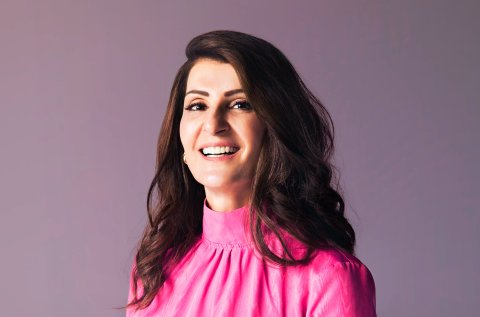
"It was an extraordinary experience to get the wish fulfilled to film in Greece."
When My Big Fat Greek Wedding opened in 2002, it made its star and writer, Nia Vardalos, a celebrity overnight. "I'm somebody ordinary that something extraordinary happened to." Now, after the 2016 sequel, Vardalos is bringing the Portokalos family back with My Big Fat Greek Wedding 3 (September 8). Part of what has kept us coming back to the family is that "we are real people who could be your family. And I think our kookiness and our flawed, not perfect-ness is reflected in our audience's hearts." And now, with Vardalos taking on the role of star, director, writer and executive-producer, she's decided the family must go to Greece, which was made possible through Greek tax credits and Faliro House Productions, who made it "their determination to get me what I wanted, which was all of Greece shoved into one movie." And all of that happened because of Vardalos' commitment to and love of her heritage. "Those were the pluses of having Greek heritage, being fluent in Greek making movies about Greece, we were given a lot of goodwill."
SUBSCRIBE TO THE PARTING SHOT WITH H. ALAN SCOTT
ON APPLE PODCASTS OR SPOTIFY
Editor's Note: This conversation took place before the Screen Actors Guild strike was announced. It has been edited and condensed for publication.
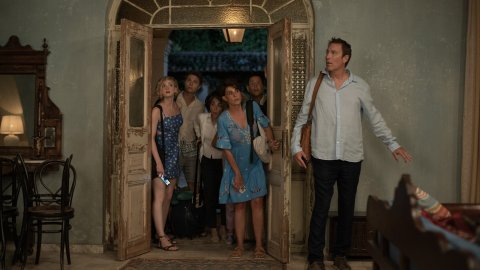
What inspired you to do a third film?
I think it was during the filming of the second one. I had so enjoyed being with the cast again and telling the story, and as it was coming to a close, the financier leaned in and said, "Do you have another film in you?" And I said, "Here's the thing. I'm committed to doing a play. I'm adapting Cheryl Strayed's book [Tiny Beautiful Things], I really want to go back and do theater." And the producers said, "We can wait." Not true, because as I was doing the play in New York, they would come to every third show and wait for me afterwards and go, "Where's our script?" So I had written it around 2018, 2019. But it was an extraordinary experience to get the wish fulfilled to film in Greece. The impossible made possible by a tax credit.
Is that how it came about?
It really is. Often when you'll see a movie and think why did they film it in Croatia? Because Croatia has a wonderful tax credit. And with tax credit comes experience, which comes crews that are taught and trained. And we did not have that in Greece. I naively write movies and then hope for the best. But what happened was, this minister of film pushed through a tax credit in Greece and we had an extraordinary experience. But I was tasked with filming everything in Greece, including the Chicago scenes. An incredible production designer would often have the optimistic view of looking at everything in Greece through the lens of Chicago, but how do we film the Chicago scenes? Well, he would often just tilt his head to the side and say, "This angle here could look like O'Hare [Airport] with some paint." That's how we did it.
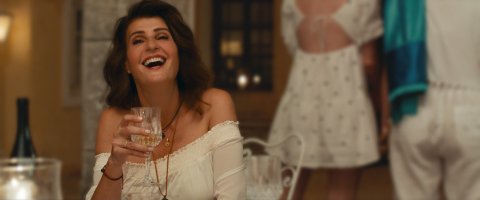
I mean, if there's any film that needs to be shot in Greece, it's My Big Fat Greek Wedding.
I completely agree. Weirdly enough, Maria Vacratsis, who plays Aunt Frieda, we're friends, and when I did theater in Toronto—by the way, you will hear me often say "when I did theater," because I often go back and do theater in between doing films, because I feel most complete when I'm on stage, being paid nothing, that is my artistic life goal. And so Maria came when I was doing the musical Company by, of course, Stephen Sondheim, our favorite. And she told me when I told her that the third one was set in Greece, Maria said, "I have to tell you something you told me on the first movie, that you always saw it as a trilogy. That one day, we would go to Greece. And now you're here and we found a movie in Greece." I don't know if I'm some sort of idiot savant, where I just push through and say, "I'm gonna do these things." And then I manipulate people to my will. [laughs]
All the best artists manifest it and find a way to make it happen.
And we were given a lot of goodwill, we got a lot of permits to film in places that normally would not come our way. We filmed around Syntagma Square, which is Constitution Square, where there's the changing of the guard. I got to put a white convertible there and pull it with a truck and put cameras on the front of it. I mean, not me, our amazing cinematographer Barry Peterson put cameras on the front so that we could film the Greek shops, and that's really difficult to do. But I know it was our partnering with Faliro House and their determination to get me what I wanted, which was all of Greece shoved into one movie. Those were the pluses of having Greek heritage, being fluent in Greek, making movies about Greece, we were given a lot of goodwill.
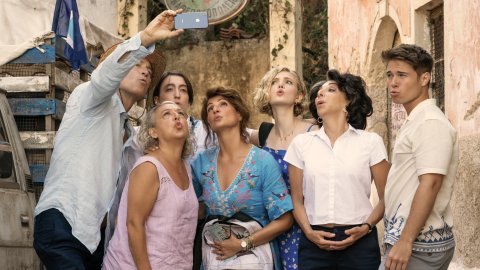
What do you think it is about the Portokalos family that people, across many cultures, respond to?
I think that we are real people who could be your family. And I think our kookiness and our flawed, not perfect-ness is reflected in our audience's hearts. And I believe that there is an energetic exchange in a movie theater. The audience sees themselves in us. And we, as a family, see ourselves in the audience. We often talk as a cast how grateful we are for the experience of being a family who gets to grow old together, who made three movies together, we're incredibly moved by the experience. Not one of us ever thinks we could have done it without each other and without the audience. We're very grateful. I don't think any of us has ever said no to a picture.
The original is one of those films that just never gets old, it's like a hug every time I watch it.
I think it is a hug. I think it's an enveloping, I think it is a feeling of comfort. Definitely. And it's a unique experience, this movie, I know it now, in that I wrote about my family, and you saw your family in my family, which means you're like me, and I'm like you. I love that. I'm somebody ordinary that something extraordinary happened to. At the same time, we all saw Hamilton, "I am not throwing away my shot," right? So when the first movie happened, every door in Hollywood flung open, I could have done My Big Fat Greek Wedding, we could be on number 19 by now. But I didn't want to do it at the time, because I believe you have to, it's an old adage, but you have to live life to write life. And I had not lived enough to write that sequel. I needed to be a mom, I had written myself as a mom at the end of the first movie because I wanted it so badly. And by the time the second movie began to germinate in my head, it was because I was a mom. And the theme of the second movie is we turn into our parents. But the theme of the third movie is we become the parents of our family.
It's so true. And again, you're manifesting. So where do we find the Portokalos family in My Big Fat Greek Wedding 3?
I did it one year later [after the last film], because while I could have done it many more years later, I wanted to erase the pandemic from everyone's hearts and minds.
Thank you!
Yeah, I pick it up a year later, where the first movie ended. We are suddenly going to the airport. And here's why, because in the blink of an eye, so much can change. So we are dealing with a lot at the beginning of the first movie. The opening is where we are now, because I wanted to remind the audience in the opening sequence what they felt for these characters and also the information that we have lost our beloved Michael Constantine. That was a moment that I did not want to treat lightly. I address it in the voiceover. I address it with visual imagery and it's the reason why we're going on our trip, because our dad asked us to go.
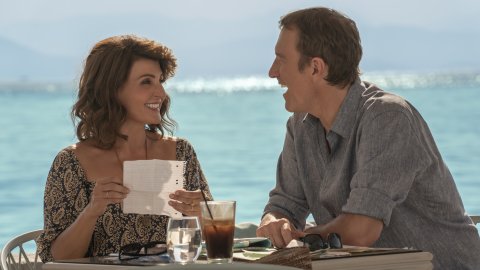
There's only one man that most people are fine with having two wives: John Corbett. We want him with Sarah Jessica Parker in And Just Like That, and we want him with you in this movie. What makes him such a fantastic leading man?
He is casual and easygoing. Every delivery of his seems like he just thought of that line at that very moment. He's a writer's dream. As an actor, he's a co-star's dream because he is very present in the scene. What I wanted to do in the film is, shot-wise, I love not too much cutting in comedy. I think comedy plays very much with a locked off camera. But a surprise for me was in a very emotional scene with John Corbett, we were both so in the scene and actually talking to each other, like a married couple, that I didn't use any cutaways that I had filmed. When I was in the editing room, I just kept looking at the close-ups in the cutaways and medium shots, and I don't need it. We just looked like a couple talking about a family issue, sitting at a table in Greece against the most gorgeous background you've ever seen in your whole life. But that's his gift. He is so present in the scene. In the director's commentary, I comment on his work in this one scene, because you can see him hearing me for the first time.
I've always felt like your character is the audience and John's character is what we long for. We really relate to you two and how you connect.
Thank you. I wanted to create a character that is, in the first movie, is flexible, right? That he sees what he has to do to win over this family is not a compromise of his integrity, but a challenge for the trust that he wants to earn. And that is always what guides me as I write his character. In the third movie, he just goes off on his own quite often and discovers Greece, because I believe to visit a country, you actually have to know its people. So that's what he does. He's just really easygoing and very fun.

You have multiple roles on this film: you're the writer, the star, the executive-producer, the director. What do you like about the process of being so deeply invested in the creative process?
I think that watching from the sidelines on the first and in the second film watching the characters become who they are, because words are nothing without an actor, right? I realized that if I was going to possibly complete the trilogy, I felt that it would be doing myself a disservice to not be brave and step forward and direct. I was firm and loving in my approach to directing, and I created a friendly set. I would talk every morning, I would communicate constantly: "This is what we're going to do." I was not their mom, I was not their yoga instructor. I was the director here to lead and guide. There will be no crying on the set and no yelling. It was wonderful. Absolutely wonderful.
How do you balance roles, between acting in the scene in one moment and then shifting to directing?
I had done an episode of Curb Your Enthusiasm and it was directed by Larry David. I watched how he would be in a scene improvising. Sometimes, as we were improvising, he would say to me, "Say that piece again, but make it shorter," right across from me, it was incredible. What I decided to do was not direct from within a scene because we're not improvising. What I would do is speak to the actors before, tell them who they were, where we were, where they were in their emotional arc, remind them of the secret they were keeping, etc., and then we would begin. I learned this by shadowing other directors, after the first take, do not cut and just let actors warm up and do it again, and do it again. Often people need a break, and I would cut and give them a break. Let an actor think that you've got it even if you don't; it's not a lie to say, "Great, that was great," and take a break and give them the exact same piece of direction that they have not gotten, with different words, from a different angle. You say, "I want to try something different now." And you give them the exact same piece of direction, but make them feel confident, make them think that they can do it.
And I'm sure, from acting standpoint, it must be helpful to have an actor they've known for 20 years be the one to give them direction.
Yes, yes. For example, I know Joey [Fatone, who plays Angelo] likes to do his lines quickly. He's very funny and he's off the cuff. So I know how to rehearse him, and how to get him ready for a scene. What I was extremely touched by with all of them is they all want it to be good for me. I was really touched by that every day. Every day, Louis [Mandylor, who plays Nick Portokalos] would take my arm and say, "Do you have it? Because I know you don't move on until you have it. But do you have it?" Isn't that amazing? There's no way we could have done it if there was any strife or anger or hurt feelings on the set. They were just there to make this movie.
I have to ask you about Connie and Carla. It's become a cult classic. What do you think it is about the movie that people still love?
That's so good. I think first of all, it's camp. And also, it's unabashedly about tolerance and love and my message of hope. That message is so whispered within that film. It's kindness that's going to get us through. And we have showtunes. We just can't go wrong when we're singing showtunes.
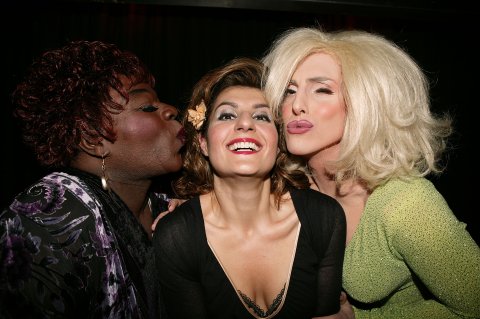
What was it like to be fully put in drag day after day?
So much fun. As theater geeks, it was a lot of fun. It's a lot of time in the makeup chair, but that's always a fun place to be because all the good gossip happens in that trailer. And I thought that the makeup and hair team did an incredible job of blocking out our eyebrows and lifting up our faces. We learned to dance that way and just be fabulous. I've told this story before, but let's do it again. I had my vitamins in a Ziploc bag. And Joan-E said to me, "Oh, no honey." And Alec Mapa and Joan-E were like, "Go to Prada and get a little purse to put your vitamins in; you look like someone's granny with that in your purse!" I did. I went and got like a little Zippy Louis Vuitton bag for my vitamins.
I hope that you've kept that up till this day.
To this day. Absolutely. What I loved about being in the community—and I was extremely welcomed when I was doing the research, because I was already a known person when we started to make that movie—I learned a lot about what to say and what not to say. Amazingly language has changed. Now there's language in that film that we don't use now. And that's a beautiful thing, as we evolve. I like that. But I learned so much about sass and style, dressing in a tight corset with shoes and walking around like that. I just felt beautiful.
It really shows in the movie, how those things can bring out a part of you you didn't know was there.
Yeah, I think so. Stepping into another person's shoes at any time offers us a perspective that we would never otherwise have. And I learned a lot talking with the people who do drag on our set. I mean, there's so much hate and bullying and, at the time, I remember thinking it'll pass. And it's only gotten worse in our lifetime. Basic human rights have been stripped from our community. And I say our because you and I are in the same community as a person who is absolutely an ally and a supporter. I'm watching things happen that are an abomination to humanity. In this country, the land of opportunity and freedom.
Listen to H. Alan Scott on Newsweek's Parting Shot. Available on Apple Podcasts, Spotify or wherever you listen to podcasts. Twitter: @HAlanScott
About the writer
A writer/comedian based in Los Angeles. Host of the weekly podcast Parting Shot with H. Alan Scott, ... Read more














